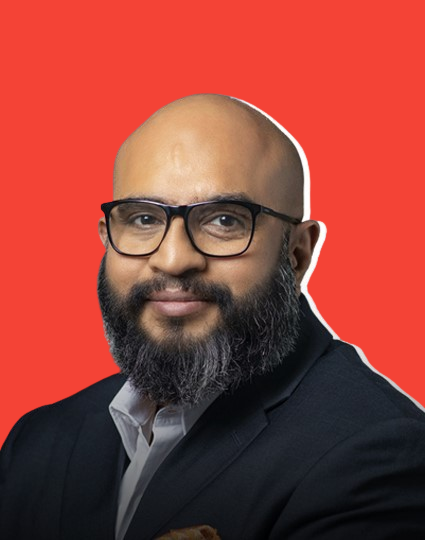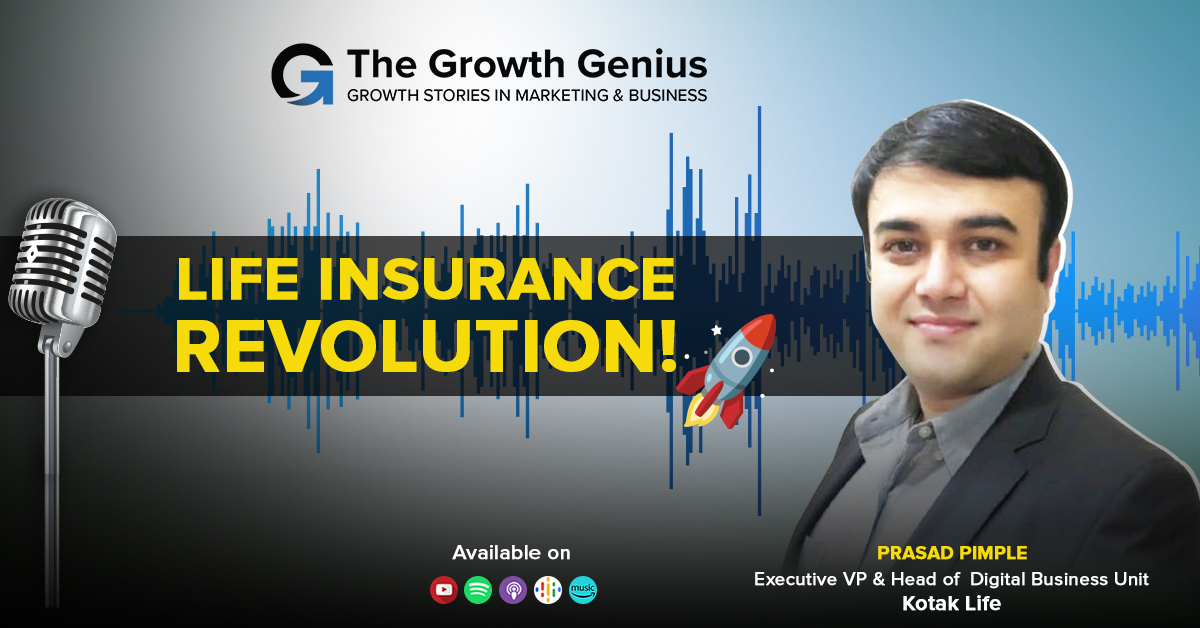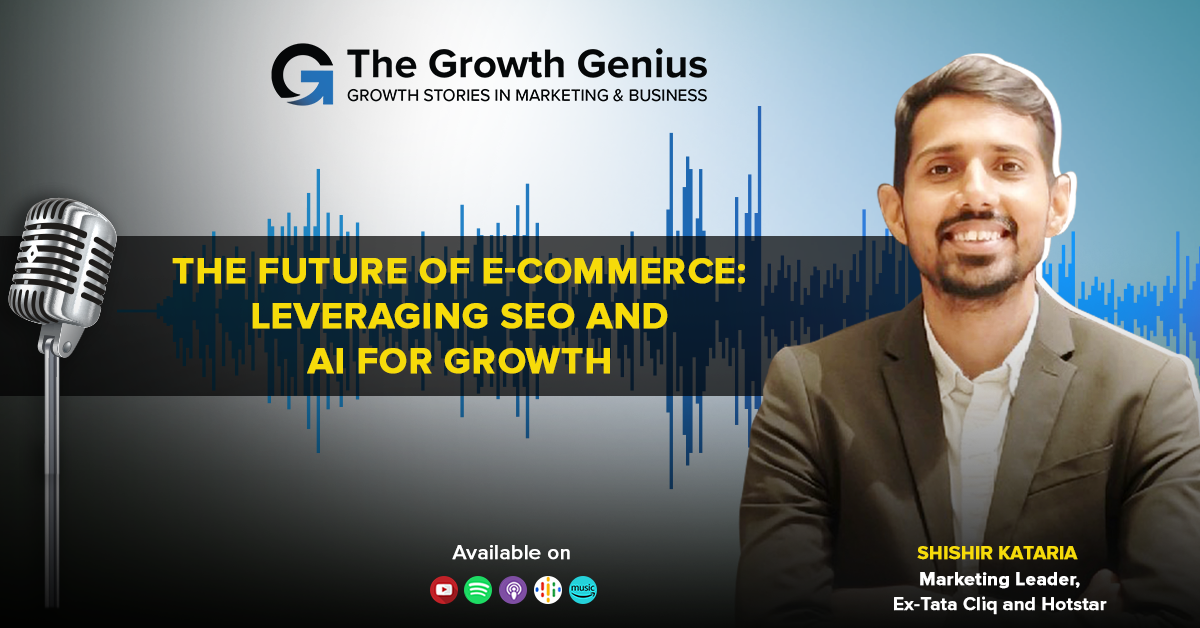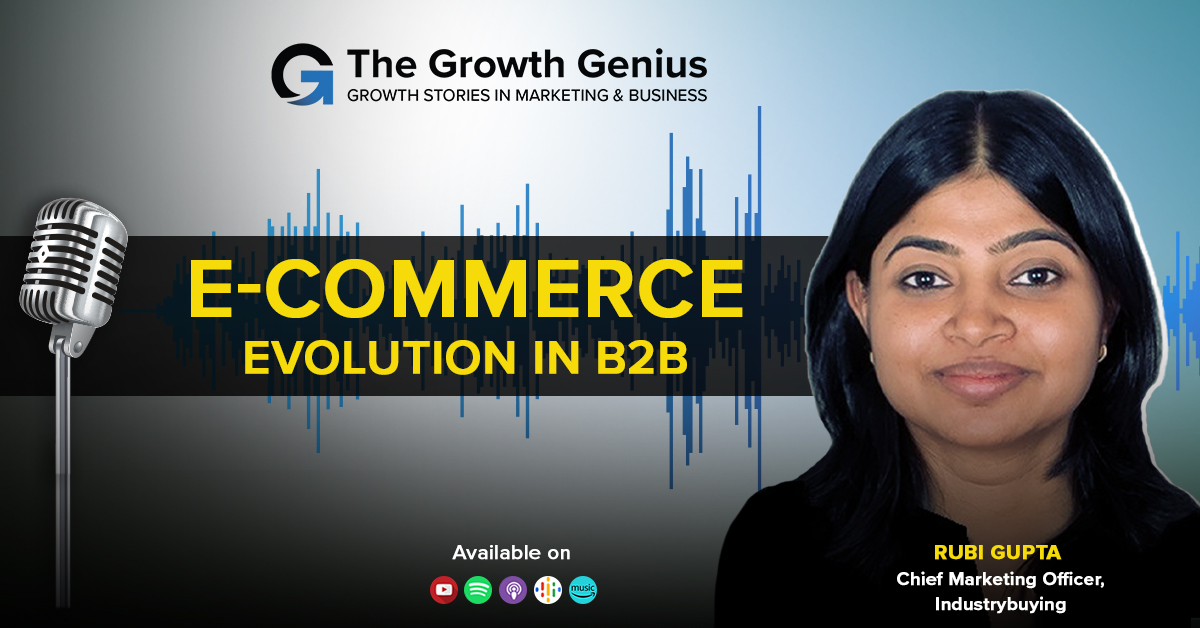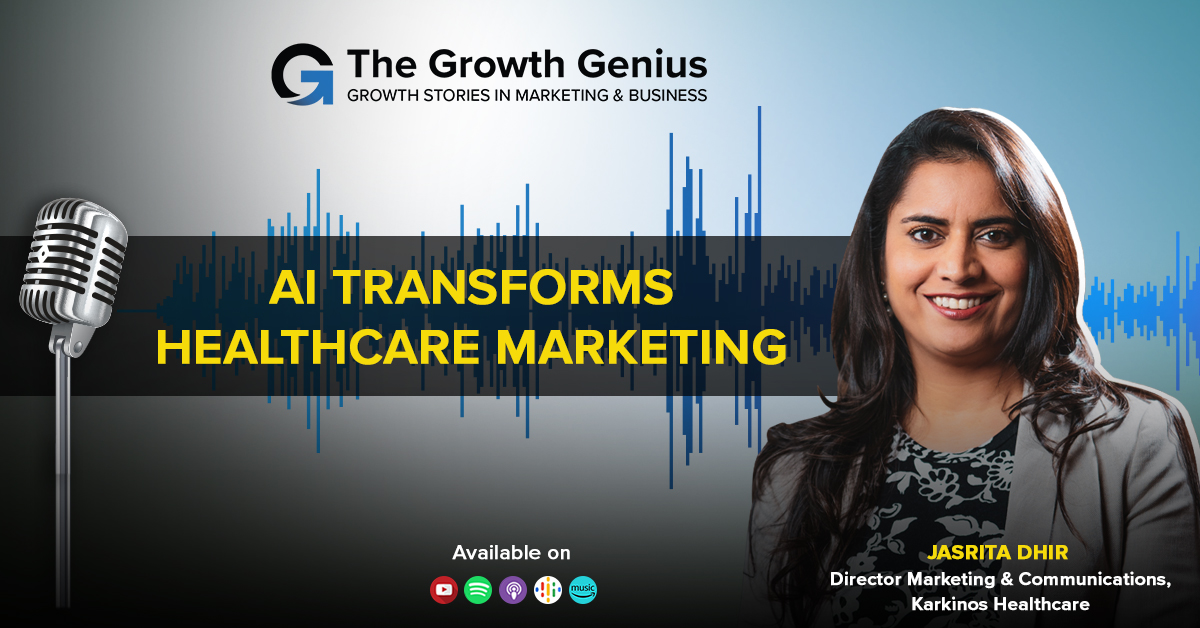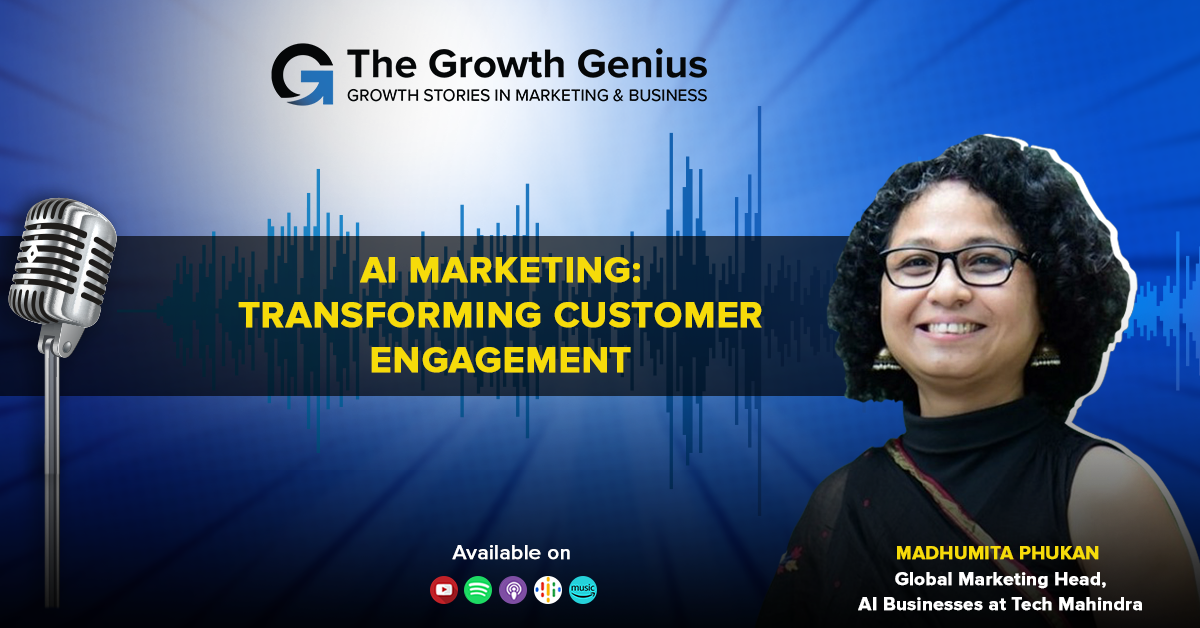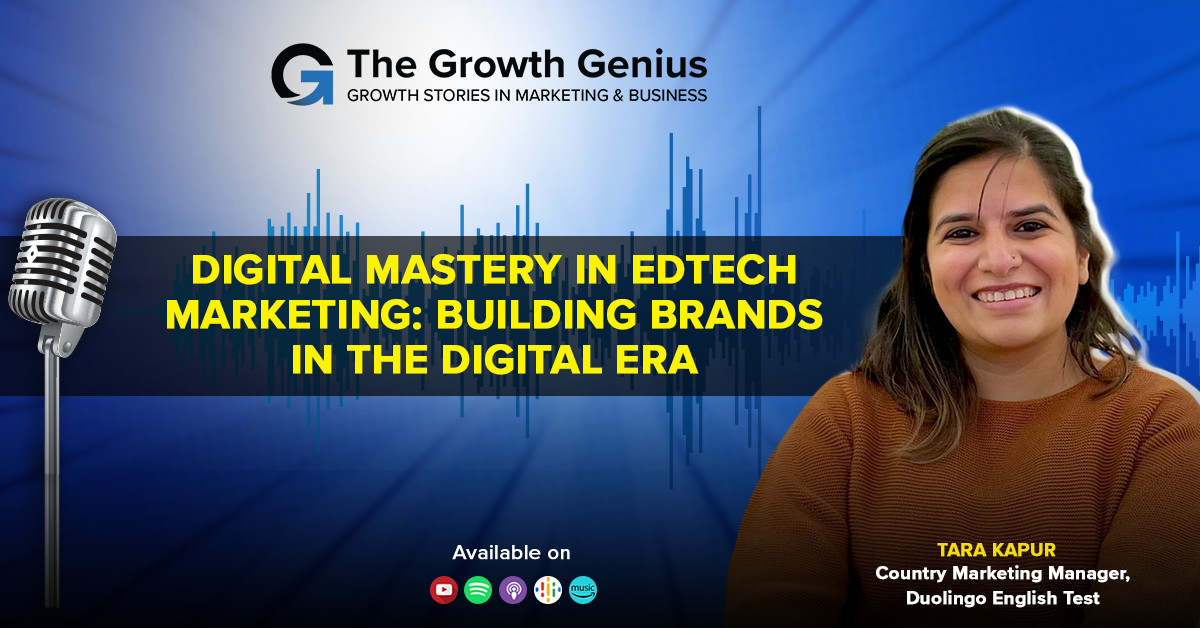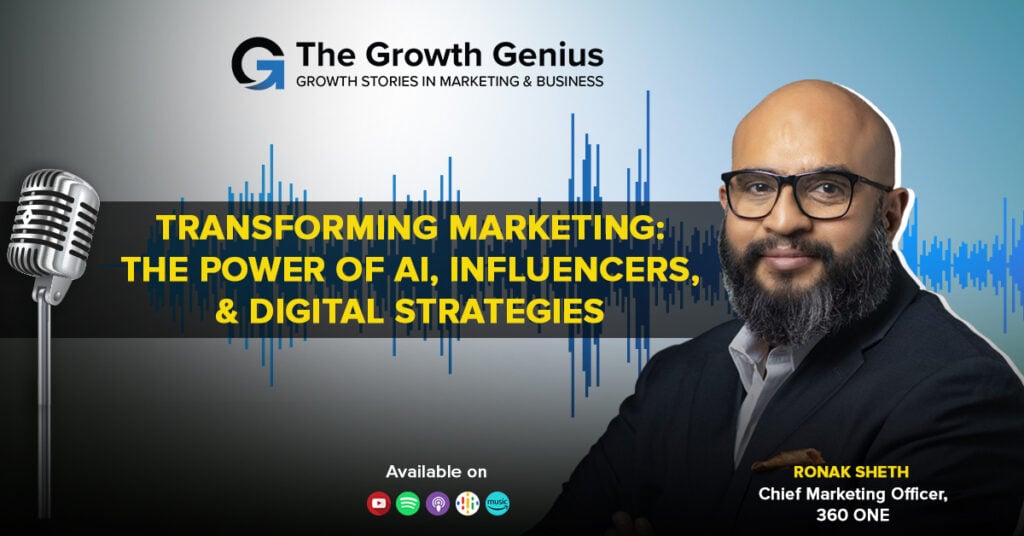Listen on your Podcast app
Summary
In this episode of The Growth Genius, Ronak from 361 delves into enhancing customer experience and leveraging AI in marketing. He shares strategies for understanding customer needs, optimizing websites, and debunks myths about AI replacing jobs. Ronak also offers career advice for aspiring marketers, emphasizing patience, continuous learning, and the importance of foundational tasks. His insights provide valuable guidance for both new and experienced marketing professionals.
Key Take Aways
- Deep Customer Understanding: Build comprehensive customer profiles to cater to their specific needs.
- Relationship Manager Role: Relationship managers are crucial for gathering insights and fostering meaningful engagements.
- Website Design: Prioritize solving visitor problems to enhance engagement and lead generation.
- AI’s Role: AI accelerates processes, fosters innovation, and aids in data analysis.
- Job Security with AI: AI will not replace marketing jobs but will strengthen marketers’ roles.
- Data Utilization: AI’s ability to analyze large datasets provides actionable insights.
- Career Patience: Success requires patience and readiness to undertake foundational tasks.
- Continuous Learning: Stay updated with technological and consumer behavior changes for long-term success.
Read Transcript
Ronak Sheth:- Back in 2010-11 nobody had heard about this word called experiential marketing right I think that’s something that comes recently when we are dealing with retail investors we usually take a root of mass advertising approach for a website was not to talk about what we have to offer you of course that happens but that happens under the ages of saying what are your problems as a person who’s visiting the website.
Mehul Ashar:- Welcome ladies and gentlemen to yet another episode of The Growth Genius the podcast brought to you by Infidigit the SEO Specialists it is here that we share growth stories in marketing and business by industry leaders our today’s growth genius is someone whose career has transversed across various Industries though he uses AI a lot in crafting his marketing strategies he also gives a lot of importance to the power of human interaction without further Ado please join me in welcoming Ronak Sheth the CMO at 361 thanks a lot Ronak for joining us on the growth genius podcast we are truly delighted to have you on the show.
Ronak:- Thank you Mehul thank you for inviting me to your wonderful show and I’m glad to be part of it and to me.
Mehul:- Ronak let me ask you what role do you play as Chief Marketing Officer at 361?
Ronak:- Sure Mehul so at 361 I lead as part of my CMO duties and responsibilities I lead marketing branding Communications are in media as well as events and experiences across all the businesses that we have uh as part of our brand which includes wealth management Asset Management our own nbfc our own succession and succession and state planning business so we I look over across all of these activities not only in India but across the globe we’ve got overseas offices in Canada US Dubai and Singapore.
Mehul:- Thanks thanks Ronak for that so my next question is you know your professional life has transitioned across various Industries so tell us more about your journey.
Ronak:- That’s true me my professional life has been uh how should I put it very interesting and non-conformist because that’s what I’ve been told so i’ I’ve never moved into the same industry again so I of course been part of family managed business back in the days when I was in in college and I of course ran I was with my father in his Imports paper and stationary business post which I of course uh started out on my own to start an IT education company which of course these days we call edtech back then we used to call it it education and this was right around the time when computers and and information technology was taking roots in the country so 1999 if I’m not wrong and build that up in East India I’m so I’m originally from Kolkata and so all my initial work has been in that part of the country build that edtech business across 45 franchise centers and 45,000 students over 5 years and then kind of sold that out exited and and uh you know kind of did my masters from XLRI to then move to Bombay to join the largest paper Manufacturing Company in the world and they were wanting to set shop in India and move their manufacturing facility from Zurich to India so I led that project for two years post which I moved to a professional training and coaching company in Bangalore where they were the leading uh education professionally training providers for the it segment the information technology Enterprise Services right so your ibms G of the world and those are the times when the BPO KPO were you know Finding their roots in the country so let that for about one and a half two years back to Bombay with them to then join iifl private Wealth Management in 2009 uh because that’s what it was called back then of course and and we’ve evolved in the last almost 16 years in fact uh yesterday we completed 16 years of 361 existence 8th of April was when in 2008 when the company got Incorporated so yeah and we are 16 years away uh one of the largest wealth and asset management company in the country so with almost $55 billion of assets.
Mehul:- Amazing and Ronak since you mentioned 361 I know everybody would be intrigued to know you know what that stands for I would like you to share that story.
Ronak:- Sure so as everyone knows we got demerged IFL wealth and asset management got demerged from IFL Securities back in 2019 at that point in time it was IFL Holdings if I’m not wrong so of course we were separately listed on the stock exchange which essentially meant we had our own set of investors shareholders employees and clients and forever we’ve always focused on the wealth management side of the business since our Inception right uh of course Asset Management did start about 6-7 years ago but primarily at before uh since Inception we were a wealth management company so we’ve been toying with the idea since everything was separate barring of course Nirmla & Venkat being core members in in our growth Journey since Inception and playing a pivotal role and and also as as part of the board and and shareholders in 20 uh 2021 we were kind of towing with the idea of saying you know how do we kind of gear up for the next decade right because what is happening Mehul is we are seeing a huge intergenerational transfer of wealth from the older generation to the newer generation right and uh we were looking at something which is more modern more widely appealing to the audiences right so where it’s acceptable even to the older generation as well as the newer generation and we wanted to kind of bring out a name which which essentially pronounced our EOS of how we did business and 361 uh was a brilliant name that we came across which is nothing but simply put 360° view of the one person who is most important to us our clients so that’s the meaning of the word 361 which also is now our brand and that’s how we.
Mehul:- Yeah that’s an amazing way to look at it so I wanted you to share that story thanks a lot for that Ronak.
Ronak:- My pleasure.
Mehul:- So since you have worked across Industries our marketing strategies for BFSI are different from let’s say e-commerce or B2B or B2C or any other industry?
Ronak:- Sure I think uh every industry has its own unique approach to marketing branding and uh client engagement if I may use right um and again so all the more different when you’re are talking about B2B versus b2c right for example when I was in it kids which was my edtech firm right we used to actually go from building to building promoting our product and and our brand right uh because the the biggest my my target audience was 4 to 14 years old but the decision makers in their case were their parents right so it made it important for us to reach to the parents who would be available typically if you went to housing societies versus 361 where we are dealing with high net worth and ultra high net worth individuals right so when we started in 2008 we used to look at individuals with at least a million us do of investable surplus whom we would try and on board as clients right today that number has evolved where we look at um client segments where we look at a million to say 5 million and $5 million and above of investable surplus so two segments is what we essentially cater to on the wealth management side on the asset management side again we look at both B2C as well as B2B because the channel Partners mutual fund Distributors if is also our clients who help us distribute our products uh but also retail investors because we also have mutual funds we also have PMS Portfolio Management Services we also have aifs which appeal or as per law and the regulator can only be invested with a evoled investor right so somebody who understands the risk of investing in products which are under the aif regime right so within 361 itself right on one Spectrum or on one end we’re looking at ultra high net worth individuals who probably has say 500 crores of net worth right somewhere else we looking at somebody who’s going to do a sip of 1,000 rupees right so and and and or as well as investor or Channel partner right who’s going to down sell or or or cross- sell my product down to their clients right so the variety the the challenges are are very different because when you are dealing with different kind of customers different psychologies come into play and those psychologies kind of you know necessitates you to change your strategy across the Spectrum right so when I Market to an ultra high networth individual we take a more personalized route right a more event based experience-based face to face or a sensory approach right when we are dealing with retail investors we usually take a root of mass advertising platforms which allows me huge reach right and allows me to sell my product on their platforms when we are working with Channel Partners it’s a very knowledge driven industry right where we help understand about our products and the larger goal of improving or adding to their knowledge and expertise which allows them to then go back to their clients and position our products in a favor.
Mehul:- Very interesting in one brand itself you have different approaches depending upon the product so obviously across Industries there is going to be a lot of you know difference in the approach.
Ronak:- Absolutely.
Mehul:- Wonderfull Would you like to share any marketing strategy that you know you have seen create an impact in you know Roi for 361?
Ronak:- So I think since Inception uh uh 2009 uh when I kind of on came on board uh what what we realized very quickly m is given that we are dealing with hni and Ultra hni clients mass media right so whether it’s out ofdo television radio print may not work for us as brilliantly as we would expect right because when you come from a retail industry background you think you know the best way to build a brand is to print front page ads right or or get Rj’s to talk about your brand right so you do tie-ups with radio stations or even television ads right we we’ve all grown up seeing tv ads uh specific especially for fmcg Brands right and then there are so brilliant ads from our memories from back in the ’90s right that we are there was even Evergreen today right but we very early on realized saying that look that’s may not be the brilliant best approach so what we did is we did a huge pivot we moved to something called experiential marketing now back in 2010-11 nobody had heard about this word called experiential marketing or uh there didn’t exist a role called client experiences head right I think that’s something that has come more um recently right in the last year or two years right but in 2010-11 that’s what we realized and uh we pivoted ourselves to saying okay how do we find a FaceTime with the people that we want to reach out to right and what is it that they are looking for or are interested in and why should they come to an event that I’m hosting right uh so thus built the whole strategy of experiential marketing and since 2011 to today uh we are probably the Pioneers or the innovators and the industry leaders in experiential marketing across bfsi possibly across even other Industries um and what has helped us Mehul is from a startup with no clients no assets back in 2008 today we are leaders in the industry right we’ve actually changed how wealth management as as a as a platform as a category kind of works of course marketing isn’t the only differentiator right I think we we were Pioneers also in several product categories the kind of products that we were able to bring to our clients right the kind of service that we gave to them the kind of personalized approach uh that we came with so there are multiple factors but one of the key factors in in building this entire franchise uh was experiential marketing approach to the extent where so for example if I was to some take out some statistics and share with you in 2017-18 the team executed close to 200 plus events in a year right now that’s the kind of scale that we are talking about and these events were multitude we did webinars online as well we did product launches we did client experiences we did money can buy experiences we did annual client events so multitude of things right both and across joners there were education lead event there were entertainment lead event there were sporting experiences Leed event there were product focused events right so multitude and both with industry experts as well as 361 experts all coming together and I think that for us has been if I was to say right key driver in how we’ve been able to build and scale the brand over the last 16 years.
Mehul:- Wonderful I mean that you are talking of one event almost every day right that’s that’s quite a bit to cover for the entire year right?
Ronak:- Yeah and we weren’t a massively large team we were just a team of 4-5 people.
Mehul:- That’s really insightful thank you so much for sharing that Ronak coming to our next question, you know do you share your insights on the role of influencers in marketing?
Ronak:- I think the way world is moving right towards digital and you know on an average and I was just reading some statistics as today morning uh an average Indian spends about 6 and a half to 7 hours on screen and then that’s that I think goes for an average adult across the globe right now 7 hours of your wake time when you’re spending on a screen and when I say screen it could be mult any screen it could be mobile it could be tablet it could be laptop desktop right screen which essentially means that we are consuming massively on 5 in to the the 13in screens that is in front of us right and that’s where I think influencers uh specifically content creators play a huge role in helping build Brands and this is my completely personal opinion influences come in in multitude of ways I think influencers are not just those who have a million followers and who charge you that whatever 3-4-5 lakh Rupees to do your real posts tweet Etc right and then and I think in that sense at 361 and then of course we as a firm have been extremely Frugal in our in our Sprints right and we’ve been extremely watchful so what we’ve used is we’ve used uh some of our clients as our influencers right and that has allowed us a huge success in in many ways right uh because we’ve changed the definition of influences right to not just content creators or or having million followers that person doesn’t have any follower right but he’s at the end of the day a client he’s a consumer right and he has or she has the ability to talk about our products and services our experience right and that kind of allows us to gain more clients uh in the process right because at the end end of the day a job of the influencer is to help me build my brand right and help me acquire new customers right and if I’m able to do that through making my own clients my influences and using their word so it’s a traditional Word of Mouth concept right we’ve all we’ve all been there we’ve always promoted services or products that we’ve loved right so in a way when that word of mouth used to happen in the earlier days right we were acting as influencers essentially and we’ve kind of looked at that dipped into that whole age-old idea modernized it right to kind of bring it out to the to the marketplace and I think that’s worked brilliantly for us of course given that we are in the financial services space you know how the code of advertising in from or or any other regulator and rightly so I think the interest of the small investors those codes help immensely to safeguard their interest so I think Regulators are doing a brilliant job but this I think was a great path that we found where you know we got customers to kind of be our brand ambassadors.
Mehul:- Very interesting thanks for sharing that Ronak my next question is about SEO of course so uh you know what role SEO plays in the overall marketing of any brand according to you?
Ronak:- Pivotal is my single word if I was to kind of you know say that for any brand to to be seen on the internet SEO plays a huge role and may who better than you kind of knows that right getting discovered then having the ability to ex you know be present in a prospects journey to find out the right partner for their need right is is extremely critical these days and we are at a stage in in the life in the human evolution right where everything is being asked to Google right and in fact there are enough memes and jokes right saying Google you know if you don’t know something right so that’s the power of the the engine the platform and there there in lies also the power of SEO right about how can you as a brand become discoverable right how can you be found uh in a customer or a prospect’s quest to find the right brand of course that will not help you acquire the client right I think that’s a hard work that we will have to do as Brands but at least it puts you in a consideration set or at Le at least the SEO helps you to kind of reach a stage in the customer’s Discovery Journey where he’s willing to have that one conversation with the brand and I think that itself is a huge positive towards the growth of the brand right so I think SEO is is extremely important and yeah we given that we were a very focused on the high netw worth ultra high netw worth individual segment right which essentially if you ask my target segment across the country in a 100 billion in a 1 billion plus population right we’re looking at about 300,000 families right so for the longest we believed reaching them directly was the way forward right we’ve in all humility we’ve implemented our SEO strategies quite late in the day couple of years back right but we now see results and value in fact I was just sharing with my senior leadership today itself that one of India’s leading manufacturing conglomerate found us online and left a query on our website saying we would like to know more about what you do and engage with your services this was about 2 weeks ago obviously I cannot name the person but of course we know you know and then just wanting to share that we sometimes undermine the power of our digital assets especially our website which a lot of us think is just a one way communication of talking about our products and services being offered to you right but actually it can be a two-way Street where people do leave in leads and and this is this is a large conglomerate it’s it’s a billion plus dollar organization who’s left a lead on my website for us to reach out to them.
Mehul:- Wonderful thanks Ronak for your insights on SEO coming to the next question so how has user Behavior changed over time I mean does the user prefer text Heavy communication or visual content nowadays according to you?
Ronak:- Okay let me answer this in two parts right I think like I said earlier Mehul we are seeing a huge and this is this applies to us primarily right it could be different for or different people uh so banking could be very different Insurance could be very different but at the wealth management specifically right uh like I said we are seeing a huge transfer of wealth from the older generation to the newer generation and there in actually lies a huge behavioral change on how each cohort wants to engage for example the older generation would want the relationship managers to go and meet them right have a cup of chai talk about politics talk about economics talk about Cricket everything right and then in the last 5-10 minutes portfolio what should I do and what is the strategy forward Etc right and that would be an hour long conversation where you would end up talking 10 15 20 minutes about your portfolio but 20 almost 40 35 to 40 minutes you talk about everything else around right because they preferred engaging with the your relationship manager in person right coming to the newer generation which prefers a lot of DIY tools right do it yourself or they they look at Solutions which are Tech enabled right so that’s a very crude user Behavior challenges that i’ I’ve kind of put across right between two cohorts now if we are kind of looking at expanding this further right it was very easy to acquire or engage with consumers earlier through very simple knowledge driven benefit Lead approach right what has happened today is almost everybody has the same products everybody has has same Solutions right everybody is following a very ritualistic same approach to marketing and branding Email marketing WhatsApp marketings right I mean you’ll reach them on digital some Brands who are evolved will uh follow the consumer digital footprint right some Brands who are not evolved will continue to use regular Outreach methods such as email that’s Etc right but what is happening is how the consumers are facing and then what what we have realized Mehul is attention spans are Shing people today want gratification in a 5sec window span Maggie somehow you know you feel that because we’ve all grown up eating Maggie noodles right and and it was a it was a dish that used to relish and rarely get it right earlier days we been all grown up to today it seems like 2 minutes Maggie noodles is also taking 4 minutes to cook right and that’s the State of Affairs right and an analogy that I wanted to share so I think what is not changing and and this is my again personal experience and belief is we are digitizing more than required and the humanization of experience is reducing right but I think the humans seek that ability to be to interact with another human and not through a screen or not through Tech right so a hybrid model where human and Tech kind of co-exist the tech allows the user to access regular mundane activities for example in my our Case a portfolio statement now you want me is a client of ours and he wants to access portfolio statement earlier he would call up my relationship manager saying portfolio statement and he would email it to you right if I was to digitize that task right where doesn’t need to call anyone may can just log into the app or on the platform and access a portfolio statement in real time across the country or across the globe right wherein if he wanted to invest say a Crore 2 crores five crores in a specific product he would still pick up the phone and talk to the religion manager and understand the pros and cons and benefits and whether it aligns to his goals and objectives so I personally believe only Tech doesn’t work only human also doesn’t work a hybrid approach of human plus Tech very thoughtfully soon at in the center right providing enough freedom for the user to carry on activities which can be digital IED yet have a human interface to have that frequent conversations.
Mehul:- Got that that’s very uh I would say interesting in the way you put it because you know you can probably say that you know leave the chore to you know digitization but your core or you’re the ethos of the brand or service cannot be transferred digitally it has to have a face it has to have that human interaction.
Ronak:- Correct absolutely see we are we all buy into experiences right now experiences that the brands have created no matter how much I push sell you will only seek the brand out when there is a need right and and then you will at that point in time explore saying who is the leader or which are Brands which have got great customer service yeah right and that becomes one of the approaches and then you look at saying okay how can I easily acquire it right one reason why Amazon is so popular right and and and literally you struggle to find the customer care number right because they don’t want you to call they want you to solve everything digitally or swigy and zomato of the world right we all use I’m a I’m a consumer of you know or a user of zomato or swiy or any of these platforms Zupey blinket Etc right everything is first going through digital platform right and then going to a human right and I think that’s the right balance which today’s consumer expect right and for us me the the experiential marketing or the approach to ensure we create platforms where we can gather people to not only engage with us but engage with Community I think that holds extremely dear and is really favorable especially after covid right so in fact we’ve got clients who keep asking us seeing okay when are we meeting next when are you hosting something next right because we love to come to that space and not only talk to yall but talk to others right gather ideas gather experiences gather information have conversations so I think that’s still not gone out or that’s noted.
Mehul:- That’s the basic need I would say which is you know always there it’s always going to be there.
Ronak:- Correct correct and that’s the basic human psyche of you know meeting or interacting with another human being.
Mehul:- Thanks thanks for sharing those insights Ronak let’s come to the next question so since you have worked with customer experience can you share some tips on how to enhance the customer experience when they visit our website person?
Ronak:- I think the first and foremost rule or or not a rule but I think at least a the approach that I follow um is to try and understand my customer better right because if I have poor understanding of my customer how am I going to serve him because I don’t know his or her needs I don’t know the requirements I don’t know what they are seeking I don’t know what are their challenges right uh so ideally the first step is to try and know the customer better and deeper right so at 361 for example and and and that’s something that you know is part of what we what I do at as part of marketing is to also dive deep into building a customer profile right which essentially covers not only basics of you know name email ID Mobile number Etc right but going deeper down into understanding the their behaviors understanding their preferences understanding uh you know uh where they come from what Etc once we’ve going kind of build that foundational Insight right we then start understanding their engagement behavior and what are they looking at how are they engaging with my content how are they engaging with my digital assets how are they engaging with us when they come to my office or when we meet at an event or a platform that we’ve created right what are the kind of questions they are asking right which allows us to build Insight now relationship managers that we have Frontline relationship managers they are constantly in touch with the customer so they are always trying to gauge saying where is the customer in his life Journey right and then that kind of allows us deep insight and cater to their requirement in a much more informed Manner and I’ll come to your the website portion slightly later right and looking at the customer experience building that we have done right we’ve not just stopped at the customers level we’ve gone deeper into the family level so today we have engagements not only for my customer but for even their family members members so whether it’s their son or their child children right aged 16 to 20 I have an experience or a property around or an IP around that whether it’s the women folk of the family we have an IP around that whether it’s the graduate or postgraduate children who’ve come back from their Global or overseas studies Etc right and trying to find their footing right which is essentially between 22 to 30 years old we have a separate IP for them right so what we’ve essentially curated over the last decade or so is how do we attend to not only the consumer himself or herself but their extended family right and engage with them in a far more meaningful manner based on knowledge sharing as the key tenant right and then of course a little bit of information little bit of entertainment Etc kind of build together that has worked brilliantly for us because we not taking care of just the individual but we’re taking care of their family as a whole right and assisting them to grow as well in their individual Pursuits of life so that’s how it is now as far as website is concerned to your question right uh what we’ve done and in fact since the rebranding happened from IFL wealth and asset management 361 of course it entailed change of our digital assets including our website our approach for a website was not to talk about what we have to offer you of course that happens but that happens under the ages of saying what are your problems as a person who’s visiting the website what are your challenges what are you looking for what are you seeking right and if I’m able to decipher that quickly within very few clicks and I’m able to take you to a a page with the problem statement and a solution or a potential solution right the propensity for the person who’s attending the website to leave us a lead or to call us or to email us increases manyfold right and that I think is being excellent for us in the last 12 to 18 months since we’ve got rebranded we’ve approached our digital assets from this lens saying how can we make it customer first and brand second right and that’s really helped us to create a fantastic customer experience and this is not because it’s my website I’m I’m talking about this this this is the feedback that we’ve got from our prospects who’ve come and engaged with us this is the feedback that we’ve got from our customers right saying that it’s really great the approach that you all have taken and we now lead through thought leadership we now lead through knowledge dissemination so that these two kind of has worked really well for us.
Mehul:- Very interesting thanks for sharing that Ron coming to our next question wanted to know your input on AI in marketing what do you think about that?
Ronak:- Well I think the the more you go on the internet the the more you see fear saying that our jobs will be taken away my experience has been very different I’m a heavy user of AI in marketing right in fact um I now push my entire team to you know you know start using generative Ai and let me tell you not one job has got lost in fact we’ve hired more people than what we were maybe a year year and a half ago right um I think generative AI if used correctly can become a massive Aid in a marketeer life right for a couple of reasons one given that everyone’s attention span and patient levels have just shrunked we marketeers are constanti chasing deadlines because the business needs everything as of yesterday right and it’s a marketear it’s it’s a reality check right no matter how many policies and processes we all build there will be something which will be required as of yesterday and we deal with it on a very regular basis all of us right uh generative AI in that sense allows us to hasten or speeden the process of output right it allows us to build or design things in a manner that possibly we never imagined or we never thought or we limited by our experience and exposure and that’s also a reality all of us come with a finite exposure and experience even though how vast it may be right and then AI allows us to kind of break those barriers in my opinion allows shows us possibilities shows us uh things that we never imagined right Innovation it allows us to innovate in multiple ways uh so I think I think generative AI is a great Aid in marketeer life it’s not going to take away our jobs but probably cement our position in the business realm more firmly probably get us a seat at the table right which a lot of marketeers uh struggle to get because we are always looked as an expense Department right or in a lot of cases creative Department right or public relations or media Department right or digital right I mean these are the facets of marketing essentially how we get branded right I think it’s much more and then that’s a role that we’ve actually at at 361 the marketing department AIDS in business objective achievement right uh we help business achieve their goals and objectives through content Lead brand strategy through data Le edmarketing strategies and also through being the voice of the consumer right and uh AI plays a huge role in all these three areas right its ability to Crunch data massive data right in a much shorter period of time than a human would be able to turn it right and not only not only crunch it right but also give you analytics and insights which are sense maybe of course yeah Mak sense out of that that huge chunk of data that we deal on a daily basis right and sometimes we don’t know where to start right ai ai is a humongously useful tool to kind of you know Crunch and and make sense of that data so yeah I think it’s phenomenal what the world the way the world is is going and it is important and imperative for marketing to lead or speak the business language and AI essentially allows us or helps us to do that also.
Mehul:- Wonderful the way you put it that yes I mean it gives a seat to the marketer on the table or you know probably amplifies the voice of the marketeer in the room.
Ronak:- Absolutely absolutely and because you are using data to lead your conversations right it automatically becomes so much more meaningful also to the business.
Mehul:- True true very true that was very insightful thanks for that RoR last question uh for our audience what advice do you give uh to aspiring marketing professionals aiming to succeed in the Indian wealth management sector?
Ronak:- I think okay so I may not be applicable to the wealth management sector per se but I think a generic advice to all marketeers who who are looking at succeeding and and starting right uh is don’t expect to become a vice president on day one don’t expect that the the business or the CMO will give you fancy projects right on day one right it’s a it’s a it’s a process it’s a lot of effort right um there’s a lot of energy and and and resources and and you know experience required to reach positions there’s tons of learning especially in these times when the world is evolving so fast technology is evolving so fast consumer behavior is evolving so fast go slow be open to ideas be open to do the Dirty Work right be ready to get down in the in the trenches right and you know go through that for a few years actually right we’ve all reached uh where we’ve reached not uh somebody just picking us up and plunking us you know in in in our positions we’ve all done the Dirty Work we’ve all uh burned the Midnight Oil we’ve done all of that and and you know kind of um go come up the ladder so I think I think that Still Remains and uh yeah I think learn and increase your knowledge I think that’s the other thing that I would say because the fastpac world that we are in today everything is changing so quickly Technologies of to today are getting redundant in 6 to 12 to 18 months time right which essentially means that as a marketeer I need to learn on a daily basis and I learn through my peers I learn through people who report to me and I learn from people who are I report to so it’s a it’s a 360° learning so knowledge is and then learning is is a constant effort so I think these two advices is what I’ll
Mehul:- Wonderful these are Timeless I would say they remain throughout and hopefully you know people in the audience would uh you know them is my hope so with that we come to the end of the podcast thank you so much for your wonderful insights and especially the way you put it you know was something that actually I would say you know to see the penny dropping at times when you know we you know put them in smaller videos or reals because that is something which is very insightful and at times it you know helps you or you know makes you go back back to the fundamentals be digital or whatever when you talked about uh you know the human touch you know that is very important in spite of whatever digitization we have that cannot be replaced by anything else so thanks again for sharing those wonderful insights and putting them very nicely for the audience to relish I would say and yeah that’s about it.
Ronak:- Thank you so much for having me here I’m glad I could share at least my experience and learnings with the audience you know and I hope absolutely sure and you know they can draw and draw these insights into their daily lives.
Mehul:- In you are probably I mean we have had around close to 100 guests and you are probably the only one with a wealth management background.
Ronak:- Okay interesting yeah yeah glad to know.
Mehul:- That I had from FMCG and you know other verticals but yes wealth management I think you would be the first.
Ronak:- Sure no no I’m glad that I see again finally here as well
Mehul:- So thanks, Ronak so ladies and gentlemen we come to the end of yet another episode of The Growth Genius Ronak put it very nicely when he talked about AI that it actually helps in amplifying the voice of the market here in the room for more such insights do watch the podcast we are available on all audio and video platforms the link to all of these are given in the description below so till the next episode of The Growth Genius keep learning keep inspiring thank you.

Popular Searches
How useful was this post?
0 / 5. 0









